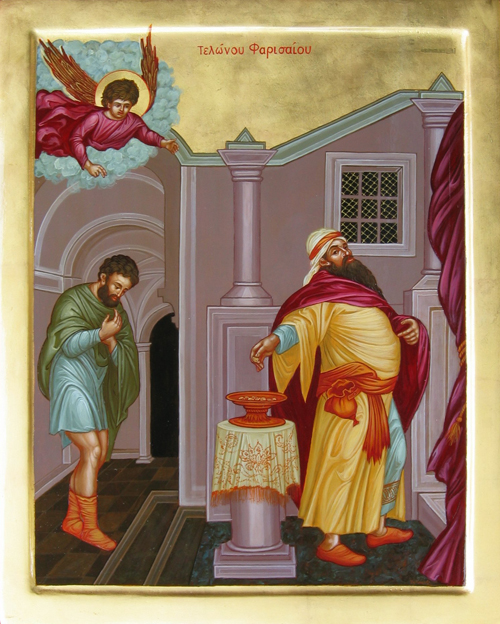
Last week, Jesus offered a widow badgering a judge for justice as a model for unceasing prayer. This week He teaches that the prayer which wins acceptance from God stems from humility of heart.
Today's parable has unwittingly contributed to negative stereotypes many people hold of religiously observant Jews. The fact that a Pharisee is one of two types of persons approaching God does not mean that all Pharisees fit this description.
Even some of Jesus' disciples may fit the bill of those “who trusted in themselves that they were righteous, and regarded others with contempt”. Christians must be wary of regarding Jews with impressions drawn from the Pharisee of this parable.
We know from literature contemporary with the New Testament that many good and observant Jews confessed themselves sinners. For example, in the Psalms of Solomon, an apocryphal writing, the righteous are those who know they are not sinless, accept chastisement from God for their sins and receive God's blessing after making atonement for sins.
So the Pharisee and tax collector of the parable, then, were “types” of Palestinian Jews drawn by Jesus to illustrate a point about true religious dispositions. The Pharisee was chosen because he represented the observer of Mosaic law who surpassed others in piety. The tax collector was depicted as he was because he represented a type of non-observant Jew whose piety was negligible. The parable implies that one person's outlook is worthy of imitation and the other person's attitude is to be shunned.
The parable extols humility (“all who exalt themselves will be humbled, but all those who humble themselves will be exalted”). It points to pride as the fatal trap of all who make serious efforts to follow a religious life or make a career of religion.
The exaggerated contrast Jesus draws between the two individuals makes them cartoon-like characters. Jesus' audience knew that the Pharisee was a lay person who aimed at putting into practice in his life the ideal of holiness by complete observance of the law. And that the tax collector—as an agent of the occupying power—was lax in carrying out the law and considered unclean in the religious sense.
Though the Pharisee's prayer appears hypocritical, it paralleled Israel's thanksgiving for its election by God (cf. Deuteronomy 26:18-19). The Pharisee's thanksgiving began by praising God for the fact he did not live in sinful ways (“not like other people: thieves, rogues, adulterers, or even like this tax collector”). He went on to mention that he was grateful (to God) that he was able to carry out positive religious duties: fasting (out of penitence for his compatriots' sins?) and tithing (on “all my income”), possibly to engage in almsgiving to the poor.
The fact that the Pharisee avoided sinful practices and performed righteous acts seems to put him above reproach. But the combination of these in a prayer that put himself forward (as well as his implied denigration of the tax collector) makes even religious zealots squirm.
One senses the presence of pride, that religious zeal has become twisted and deformed. His thanksgiving makes no mention of what God has done for him. God does not need to do anything for him. He makes no request of God, nor does he strive to honour or praise God. One wonders whether such a person needs God.
Even the tax collector's posture (he “would not even look up to heaven”) and gesture of beating his breast spoke volumes. Still, his words were few and simple, “God, be merciful to me, a sinner”. The outcast's only access to God is through divine mercy, something no one can earn but all may receive as God's free gift.
* * *
Today marks the eight-fourth anniversary of the Universal Church's observance of “World Mission Sunday”. Established by Pope Pius XI in 1926, Mission Sunday keeps consciousness of Jesus' mandate to proclaim the gospel to all the world front and centre in Catholic life.
The Society for the Propagation of the Faith, which has two national offices in Canada for French- and English-speaking Catholics, promotes Mission Sunday as “a day of prayer and promotion of God's universal mission by the People of God, to be celebrated on the same day in every diocese, parish and institute of the Catholic world...and to encourage offerings for the missions”.
Mission, Pope John Paul II declared, is “the joyful proclamation of a gift meant for all and to be offered to all with the greatest respect for the freedom of each one: the gift of the revelation of the God who is Love, the God who ‘so loved the world that He gave His only Son’ (John 3:16)....
“The Church therefore cannot forego her missionary activity among the peoples of the world. It is the primary task of the missio ad gentes (mission to the nations) to announce that it is in Christ, ‘the Way, the Truth and the Life’ (John 14:6) that people find salvation” (Novo Millennio Ineunte, #56).
Fidelity to the missionary enterprise demands commitment and humble prayer, the kind Jesus proposed in his parable in today's gospel.
* * * * * *
MORE PICTURES FROM THE 3RD ANNUAL ARCHBISHOP'S DINNER
(Photos credit: Garry Bourgeois)





No comments:
Post a Comment